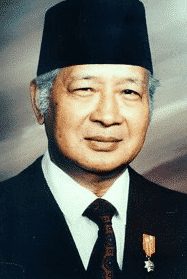Contoh Biografi Dalam Bahasa Inggris Tentang ‘Soeharto’ Beserta Arti

Materi kali ini kita akan membahas mengenai biografi dalam bahasa inggris, sahabat SBI pernah menuliskan atau membaca sebuah biografi bukan? apa yang sahabat SBI pahami mengenai biografi dalam bahasa inggris?
Yaps! biografi merupakan sebuah tulisan baik dalam bahasa indonesia ataupun bahasa inggris yang menceritakan mengenai kisah hidup ataupun riwayat hidup seseorang. Seperti contohnya, pada materi sebelumnya kita telah menuliskan tentang biografi kehidupan habibie, nah dari sana kita juga dapat mendapatka pengetahuan baru mengenai kehidupan habibi dan pada kesempatan kali ini biografi yang akan kita bahas adalah sebuah biografi mengenai presiden kedua RI, hayoo siapa? yaps! soeharto, bagaimana kira-kira kehidupan soeharto? yuk langsung kita simak aja!
Suharto was born in a small village, Kemusuk, in the Godean area near the city of Yogyakarta, during the Dutch colonial era. He grew up in humble circumstances. His Javanese Muslim parents divorced not long after his birth, and he was passed between foster parents for much of his childhood. During the Japanese occupation of Indonesia, Suharto served in Japanese-organised Indonesian security forces. Indonesia’s independence struggle saw his joining the newly formed Indonesian army. Suharto rose to the rank of Major General following Indonesian independence. an uptetted cup on 30 September 1965 was countered by Suharto-led troops and was blamed on the indonesian comunist party The army subsequently led an anti comunist purge which the CIA described as “one of the worst mass murders of the 20th century” and SUHARTO wrested power from Indonesia’s founding president,SUKARNO. He was appointed acting president in 1967 and President the following year. He then mounted a social propaganda campaign known as desukarniziation in an effort to reduce the former President’s influence and prestige. Support for Suharto’s presidency was strong throughout the 1970s and 1980s but eroded following a severe financial crisis that led to widespread in rest and his resignation in may. Suharto died in 2008.
The legacy of Suharto’s 31-year rule is debated both in Indonesia and abroad. Under his “new older” administration, Suharto constructed a strong, centralised and military-dominated government. An ability to maintain stability over a sprawling and diverse Indonesia and an avowedly anti-Communist stance won him the economic and diplomatic support of the West during the cold war. For most of his presidency, Indonesia experienced significant economic growth and industrialisation, dramatically improving health, education and living standards. Indonesia’s invasion and occupation of east timur during Suharto’s presidency resulted in at least 100,000 deaths. By the 1990s, the New Order’s authoritiarism and widespread corruption. were a source of discontent.
According to transparancy internasional, Suharto is the most corrupt leader in modern history, having embezzled an alleged $15–35 billion during his rule. In the years after his presidency, attempts to try him on charges of corruption and genocide failed because of his poor health and because of lack of support within Indonesia for moves to bring charges against him
Suharto was born on 8 June 1921 during the dutch eas indiesera, in a plaited bamboo walled house in the hamlet of kemusuk, a part of the larger village of Godean. The village is 15 kilometres (9 mi) west of jogjakarta the cultural heartland of the javaneseBorn to ethnic Javanese parents, he was the only child of his father’s second marriage. His father, Kertosudiro, had two children from his previous marriage, and was a village irrigation official. His mother, Sukirah, a local woman, was distantly related to sultan hamengkubuwono by his first concubine.
Five weeks after Suharto’s birth, his mother suffered a nervous breakdown and he was placed in the care of his paternal great-aunt, Kromodirjo. Kertosudiro and Sukirah divorced early in Suharto’s life and both later remarried. At the age of three, Suharto was returned to his mother, who had married a local farmer whom Suharto helped in the rice paddies. In 1929, Suharto’s father took him to live with his sister, who was married to an agricultural supervisor, Prawirowihardjo, in the town of Wuryantoro in a poor and low-yielding farming area near wonogiri. Over the following two years, he was taken back to his mother in Kemusuk by his stepfather and then back again to Wuryantoro by his father.
Prawirowihardjo took to raising the boy as his own, which provided Suharto a father-figure and a stable home in Wuryantoro. In 1931, he moved to the town of Wonogiri to attend the primary school, living first with Prawirohardjo’s son Sulardi, and later with his father’s relative Hardjowijono. While living with Hardjowijono, Suharto became acquinted with Darjatmo, a dukun (“guru”) of Javanese mystical arts and faith healing. The experience deeply affected him and later, as president, Suharto surrounded himself with powerful symbolic language. Difficulties in paying the fees for his education in Wonogiri resulted in another move back to his father in Kemusuk, where he continued studying at a lower-fee muhamadiyah middle school in the city of jogjakarta until 1939.
Like many Javanese, Suharto had only one name In religious contexts in recent years he has sometimes been called “haji” or “el-Haj Mohammed Suharto” but these names were not part of his formal name or generally used. The spelling “Suharto” reflects modern Indonesian spelling, although the general approach in Indonesia is to rely on the spelling preferred by the person concerned. At the time of his birth, the standard transcription was “Soeharto” and he preferred the original spelling. The international English-language press generally uses the spelling ‘Suharto’ while the Indonesian government and media use ‘Soeharto’.
Suharto’s upbringing contrasts with that of leading Indonesian nationalists such as soekarno in that he is believed to have had little interest in anti colonialism, or political concerns beyond his immediate surroundings. Unlike Sukarno and his circle, Suharto had little or no contact with European colonizers. Consequently, he did not learn to speak dutch or other European languages in his youth. He learned to speak Dutch after his induction into the Dutch military in 1940.
Good Luck Sahabat SBI semua 🙂
